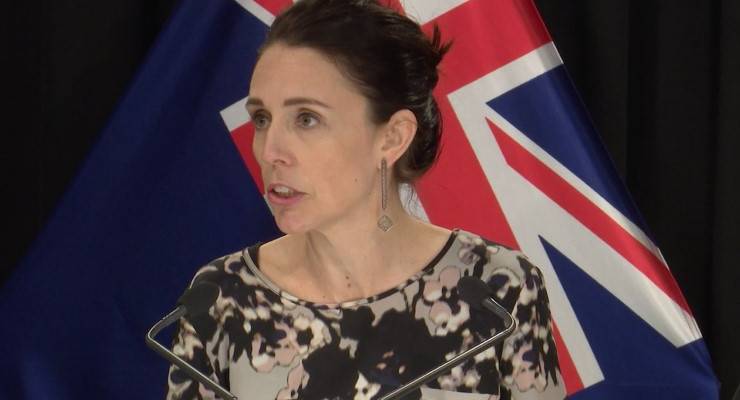
NO SIGNS OF LIFE
New Zealand police do not believe they will find any more survivors on Whakaari/White Island following yesterday’s volcanic eruption, while Prime Minister Scott Morrison is warning Australians to “prepare for some difficult news”, Nine reports.
In a statement released late on Monday, NZ police wrote that anyone who could have been rescued alive was likely evacuated immediately after the eruption, with no signs of life detected from flights over the island (it is still too dangerous for rescuers to enter, although a NZDF ship was planning to approach the perimeter at first light). Twenty-three people were evacuated, five of whom have since died, and up to 27 are still missing. Twenty-four Australians were exploring White Island at the time of the eruption, although it is unclear how many were among those evacuated, with “a number of Australians” now in hospital.
SHIFTING PRIORITIES
The Morrison government will today launch a landmark review of the foreign aid budget, reprioritising spending in the first major reset of the program since 2013, Nine reports.
The review, to be led former diplomat and senior bureaucrat Dennis Richardson, will attempt to define what Australia’s $4 billion aid budget aims to achieve, reassessing which countries receive support, how much and what for. Foreign Affairs Minister Marise Payne has flagged the importance of a “secure, stable, prosperous and resilient Indo-Pacific”, suggesting increased priority for the region. A coalition of Australia’s top foreign policy experts have called for a major increase in the diplomacy and foreign aid budget, calling on the government to refocus aid funds that have been diverted from Asia to pay for the Pacific “step-up”.
[free_worm]
BACK TO SCHOOL
Education Minister Dan Tehan is pushing for states to adopt formalised tools to measure literacy and numeracy levels against benchmarks, following last week’s disappointing PISA results, Nine reports.
Tehan has praised ongoing research on the “learning progressions” technique, and plans to present “a very detailed paper” on it at a meeting of federal, state and territory education ministers in Alice Springs on Wednesday. He plans to ask state counterparts to move quickly towards a rollout of the method, one of a series of reforms to boost student results as part of his “back to basics” approach. Writing in The Guardian, professor of education at the Gonski Institute for Education Pasi Sahlberg argues that Australian schools can be fix — but to rush the reform is to ruin it.
THEY REALLY SAID THAT?
I hope not. I think it would be foolish if they did and I think as many of you [would] be foolish if you contributed to that.
Sue Pieters-Hawke
Bob Hawke’s eldest daughter says it would be “foolish” for people to change how they viewed her father following allegations he hushed up the rape of her sister Rosslyn Dillon by Labor figure Bill Landeryou.
READ ALL ABOUT IT
Uyghur detainees have ‘graduated’ and have the ‘freedom to come and go’, Xinjiang Governor says
‘Lazy symbolism’: Labor fights back at Greens on coal exports
Russia banned from Olympics and World Cup for doping
Water wars escalate as Victoria slams Murray-Darling power shift
Sydney faces level 3 water restrictions within months
Pill testing trial ‘successful’ at music festival, evaluation finds
Turkey sends back first Aussie ‘jihadi’ ($)
Southeast Queensland to bid for 2032 Olympic Games, Annastacia Palaszczuk reveals ($)
Bushfires: NSW faces ‘lethal’ conditions as temperatures forecast to soar past 40C
UN climate talks: About 100 countries challenge Australia’s use of carryover credits
Afghanistan: US public were misled about unwinnable war, interviews with key insiders reveal
Public service review did not look at cutting federal departments, official says
CRIKEY QUICKIE: THE BEST OF YESTERDAY
Australia’s political class — no longer fit for purpose
“As Australians have become more and more aware of the need for climate action, their government has done less and less. That was neatly summed up by the way the catastrophic east coast bushfire event dropped off the political agendas of the major political parties in parliament’s last sitting week of the year, a raised middle finger from the political class to communities immolated by fire, cities forced indoors by blankets of smoke, and voters worried about the industrial-scale destruction of flora and fauna.”
Just how committed to diversity and inclusion is the ABC?
“Speaking to Inq, a handful of Indigenous and CALD contributors have raised — on the condition of explicit anonymity — simmering frustrations and feelings of burnout that have led to a churn of POC contributors at the public broadcaster. Many agreed that the worst departments in terms of representation were news and current affairs, radio, and comedy — where, in the words of one presenter, the best role anyone could hope for was ‘sidekick’.”
‘Nothing about us without us’ in disability royal commission
“The frequent reference use of the term ‘our royal commission’ signals the determination by disability advocates to retain ownership of the investigation for which they have fought long and hard. They have not hesitated to express dissatisfaction with the backgrounds of some of the commissioners, and with the high ratio of parents and service providers during the commission’s early hearing.”
THE COMMENTARIAT
No need to panic – we can fix Australian schools. But to rush the reform is to ruin it – Pasi Sahlberg (The Guardian) “Teachers are important, of course. But how much they can affect student learning in school is often less than people think. According to the American Statistical Association, for example, teachers account for about 1% to 14% of the variability in students’ test scores. The most important factors affecting student learning and quality of education are those found outside the school: students’ family background, where they live, their individual characteristics and the socio-economic make-up of the school they attend. Therefore, the majority of opportunities for improving quality of education systems are found in the society and its system-level conditions.”
Challenge to democracy to counter Russia, China – Andrew Hastie (The Age/Sydney Morning Herald): “Authoritarian states have weaponised previously benign activities like diplomacy, media, investment flows, infrastructure development, and foreign asset purchases. University campuses have become the modern battlegrounds of covert influence and interference. These activities complement more aggressive forms of subversive warfare such as intellectual property theft, forced technology transfer, cyber-attacks, and espionage. All these activities advance the efforts of authoritarian regimes to undermine the West. The democratic West has lacked the intellectual framework both to perceive and to respond to these subversive tactics. We have not inhabited the revolutionary mindset or worldview, limiting our capacity to grasp the strategy of our authoritarian adversaries as they probe the boundaries of acceptable peacetime behaviour. Our passivity is dangerous, so that we risk escalating tensions if we attempt to recover ground lost by subversive means.”
States need to help our farmers ($) – Daid Littleproud (The Australian): “Farmers, their families and their communities will need both hands of both levels of government to help them through this drought. As one Queensland farmer recently told me, while he was grateful for the FHA he simply banked it and kept it to pay his upcoming rates bill. FHA is there to put bread and butter on the table, not pay council rates — in his words, it was robbing Peter to pay Paul. The federal government has said and proven it will continue to do more if the drought continues. But it’s time for the states to put politics aside and come with us to support farmers and communities through one of the worst droughts in our history.”
HOLD THE FRONT PAGE

WHAT’S ON TODAY
Canberra
-
Immigration Minister David Coleman will address the National Press Club.
Sydney
-
NSW Ports will mark the 40th anniversary of Port Botany, one of NSW’s most significant pieces of infrastructure with a port tour and boat cruise for key stakeholders.
-
The first-ever National Smart Energy Summit will showcase the positive steps Australian companies are taking to reach zero-emissions, with former PM Malcolm Turnbull and billionaire investor and renewables champion Mike Cannon-Brookes to give keynote speeches.
New England, NSW
-
The drought-stricken region will welcome a delivery of 2 million litres of water thanks to national water-saving initiative, #FinishWaterWaste.
Melbourne
-
Melbourne’s Australia 108 will become the Southern Hemisphere’s tallest residential tower.
Adelaide
-
ATO whistleblower Richard Boyle will appear in the Magistrates Court in relation to the release of information.
-
SA Coroner David Whittle will continue an inquest into the death of Matthew Kim Morgan, who was shot dead by police.
-
The City of Adelaide will re-dedicate the Sir Ross Smith Memorial to mark 100 years since his Vickers Vimy aircraft landed in Darwin.
Regional Queensland
-
Labor leader Anthony Albanese will tour regional Queensland.
Darwin
-
An inquiry will be held into the engagement of traditional owners in the economic development of Northern Australia.
Christchurch, New Zealand
-
A procedural hearing will begin ahead of the trial of the accused Christchurch mosque shooter.











Let’s focus on a useful topic.
Morrison’s dismissive comment regarding the impact of long-term bushfires on the volunteer fire-fighters (“….they want to be there…”) is matched by his direct and open refusal to provide them with any support.
Yet I read not a word of criticism from journos for such open contempt. Prime Minister Julia Gillard would have been vilified for such sneering.
Our corporate media profits nicely from keeping us quiet.
Where, too, any criticism from Labor’s coal-huggers, or the rest of that rabble?
Australia is facing a permanent crisis that needs immediate action this Misgovernment is absolutely not interested in providing. It is having a much greater impact on us than any volcano.